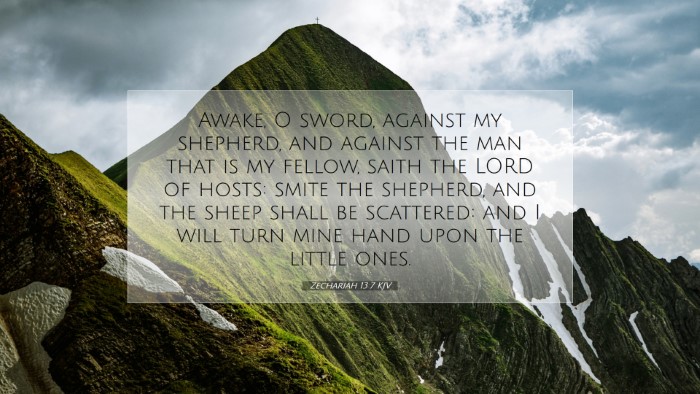Old Testament
Genesis Exodus Leviticus Numbers Deuteronomy Joshua Judges Ruth 1 Samuel 2 Samuel 1 Kings 2 Kings 1 Chronicles 2 Chronicles Ezra Nehemiah Esther Job Psalms Proverbs Ecclesiastes Song of Solomon Isaiah Jeremiah Lamentations Ezekiel Daniel Hosea Joel Amos Obadiah Jonah Micah Nahum Habakkuk Zephaniah Haggai Zechariah MalachiZechariah 13:7
Zechariah 13:7 KJV
Awake, O sword, against my shepherd, and against the man that is my fellow, saith the LORD of hosts: smite the shepherd, and the sheep shall be scattered: and I will turn mine hand upon the little ones.
Zechariah 13:7 Bible Commentary
Commentary on Zechariah 13:7
Verse Reference: Zechariah 13:7 - "Awake, O sword, against my shepherd, and against the man that is my fellow, saith the Lord of hosts: smite the shepherd, and the sheep shall be scattered: and I will turn mine hand upon the little ones."
Introduction
This profound verse from the book of Zechariah serves as a critical prophetic declaration concerning the sufferings of the Messiah and the resulting trials for His followers. In this commentary, we will delve into historical context, theological implications, and practical applications derived from the insights of noted biblical commentators, including Matthew Henry, Albert Barnes, and Adam Clarke.
Contextual Background
Zechariah, a post-exilic prophet, proclaims messages of hope and restoration to the nation of Israel. His prophecies are often rich in symbolism and anticipate the coming of the Messiah. The historical backdrop of this prophecy is crucial, as it emerges during a period of disillusionment for the Jewish people following their return from Babylonian exile.
Textual Analysis
In Zechariah 13:7, the imagery of the "sword" awakening against the shepherd evokes a sense of impending judgment and conflict. Theological insights can be drawn from the roles designated in this verse:
- "Awake, O sword": This figurative language indicates divine initiation of judgment. Matthew Henry suggests that the "sword" represents God's judgment enacted in response to the people's unfaithfulness.
- "Against my shepherd": This phrase identifies the shepherd as a figure of leadership, traditionally interpreted as the Messiah. Adam Clarke emphasizes that the shepherd's suffering is a necessary pathway to redeeming the flock.
- "The man that is my fellow": This is a peculiar expression denoting a unique relationship between God and the Messiah. Albert Barnes points out that this highlights the divine-human nature of Christ, affirming His equality within the Trinity while being sent to fulfill a redemptive mission.
Thematic Considerations
At the heart of this passage are several key themes:
- The Suffering of the Leader: The shepherd's smiting symbolizes not only the persecution of Christ but reflects the broader theme of suffering for the sake of the faithful. Henry notes that the ultimate tribulation experienced by leaders can lead to a deeper sanctification among the followers.
- The Scattering of the Flock: The response of scattering upon the shepherd's smiting illustrates the fragility of the disciples' faith in times of crisis. Barnes interprets this as a prophetic picture of the disciples' abandonment of Jesus during His arrest and crucifixion.
- The Divine Sovereignty: Despite the chaos that follows the shepherd's death, the latter part of the verse reveals God's continued sovereignty. "I will turn mine hand upon the little ones" denotes God's care for His vulnerable followers amidst trials.
Theological Insights
This verse serves as a pivotal theological affirmation regarding Christ's passion:
- Christology: This passage is often seen as a messianic prophecy, wherein the "shepherd" fulfills the role of Christ who, while divine, experiences profound human suffering for humanity's sins. Adam Clarke remarks that this foreshadows Christ's betrayal and subsequent crucifixion, embodying both the suffering servant and glorious king.
- Atonement: The smiting of the shepherd signifies the sacrificial death of Christ. In this light, the verse encapsulates central truths of the Gospel, where Christ takes upon Himself the sins of the world, leading to redemption.
- Community Dynamics: The scattering of the sheep points to the challenges faced by the early Christian community post-resurrection. This verse not only provides historical insights but also frames ongoing discussions on the unity and perseverance of believers amidst trials.
Pastoral and Practical Applications
For pastors, students, and theologians, Zechariah 13:7 extends beyond historical analysis to meaningful spiritual application:
- Leadership and Sacrifice: Church leaders can draw from the passage a deeper understanding of their calling, recognizing that they may endure sufferings akin to those experienced by Christ, which serve to shepherd their communities thoughtfully.
- Courage in Trials: The scattering of the sheep serves as a reminder for believers to remain resolute in faith regardless of circumstances. Leaders should encourage congregations to maintain faith amid uncertainty and trials.
- Assurance of God’s Presence: The promise that God will care for the "little ones" offers hope that in their trials, believers are not abandoned. Pastoral care should emphasize God's continual presence and faithfulness, framing suffering as part of the journey toward restoration.
Concluding Thoughts
Zechariah 13:7 serves a multifaceted role in biblical theology, enriching our comprehension of Christ’s mission and the communal experiences of believers. Drawing from the reflections of historical commentators, we come away with a deeper appreciation for the depth of God’s plan through suffering, the miraculous nature of God's sovereignty, and the call for steadfastness in faith. As we contemplate this passage, may we find encouragement in the knowledge that amidst trials, God’s providence remains a constant source of hope.


